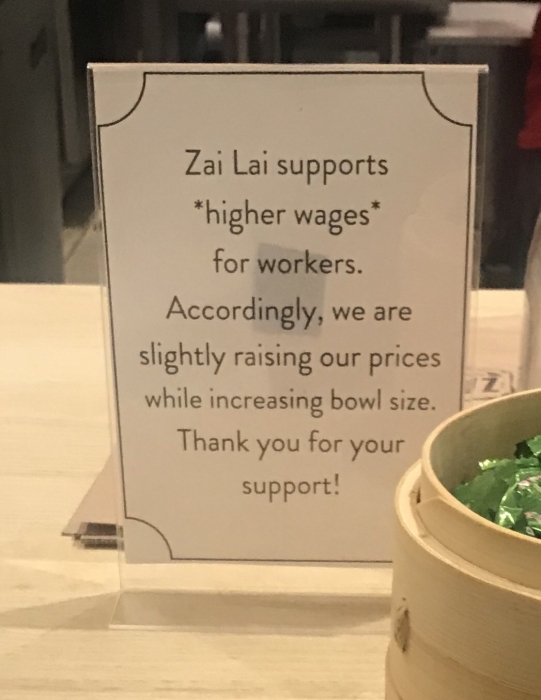NJ's $15 / Hour Minimum Wage Law
So now that you've discussed this from the points of view of business owners and customers can we look a it from the viewpoint of the worker.
How can anyone live in the NY Metro Area on a salary of less than $15.00 per hour?
ml1 said:
Runner_Guy said:are you suggesting that $15 a week is beyond the means of a family paying $15K a year for daycare?
ml1 said:Manhattan is a place where a $15 minimum wage is at its most defensible, since Manhattan's average wage is over $35 per hour and it gets tons of high-income tourists too.
qrysdonnell said:it was mentioned that the restaurant had about 150 full time employees. The restaurant was huge by NYC standards. But it's another article written by someone with an axe to grind about minimum wage earners getting a modest raise. My back of the envelope calculation was that an increase in prices of less than 5% would have covered the wage increase. It's hard to believe that patrons of Coffee Shop wouldn't have gladly paid that if it was explained to them that their $15 burger was going to cost $15.75 so the dishwashers could get a raise. The real reason that places like that go out of business is typically the sky-high rents that are non-negotiable.
How does that math work out that a $2 increase in an hourly wage turns unto $46,000 a month? How many employees do they have working at a time? 100+?
However, if $15 an hour is a contributing factor in business closings in a very high-income place, you can imagine much more significant consequences across an entire state, such as New Jersey, where in some towns (like Bridgeton and Camden) the average income is below $15 per hour.
It's hard to believe that patrons of Coffee Shop wouldn't have gladly paid that if it was explained to them that their $15 burger was going to cost $15.75 so the dishwashers could get a raise.As a regular consumer I would very well pay $15.75 for something that would cost $15, but if I ran a business or large organization and bought a product in bulk and could choose between different suppliers I would not pay a 5% premium for a product.
I therefore think that the businesses that are most at risk from a $15 minimum wage aren't restaurants, but businesses that compete against businesses in other states and sell to other businesses, like farms and manufacturing. Although NJ farms are only going to have to pay $12.50 an hour by 2024, that's still a large premium compared to the rest of the country.
Also, for products that already are expensive, a 5% premium will be real money.
So, yes, anyone can pay another 75 cents for a hamburger, but what about something that is already very expensive, like daycare? Even inexpensive daycare around here is $15,000 a year, so there a 5% increase is $750, not 75 cents.
I don't know if anyone has done price elasticity studies on any of these products or services before declaring that price increases would be an impossibility to implement. Do we really believe that if a Big Mac costs a quarter more, no one will buy one? Or if a pizza costs 50 cents more, it will drive pizzerias out of business?
Everything happens on the margins. It will hurt businesses that are already struggling. It is hard to know how something like this could affect costs. Do their suppliers need to raise their prices too, because they had to cover their higher wages? It can also be a factor in new businesses starting.
By definition, price floors will cause a surplus. This is basic economics. The only way it won't is if it is low enough where it isn't really effective.
No. I don't see the sense in making it illegal for someone to voluntarily accept a wage. Working a job is one of the best ways to build your skillset. I'd argue that it is probably the best way to build your skillset.
Making it more difficult for people to take that first step is a crime. I understand that people are concerned that there are people trying to live, raise families on a minimum wage. To me, it seems like that may point to other problems that are not likely to be solved by a higher the minimum wage.
No minimum wage could work if so many people weren't prone to exploiting other people's desperation. But, unfortunately, they are.
And there is already the exploitation loophole of paying less than minimum wage to those who want to "increase their skillset" --- It's called "unpaid internships".
That's nothing. People actually pay 6 figures to sit in a classroom for 4 years, delaying their employment and with no guarantee of employment. They often leave without getting a degree that will be of much help servicing that debt.
terp said:
That's nothing. People actually pay 6 figures to sit in a classroom for 4 years, delaying their employment and with no guarantee of employment. They often leave without getting a degree that will be of much help servicing that debt.
Oh, good. So you're all for free college tuition then?
It was a great benefit to my parents, who attended City College, as they were both from working class families.
sprout said:
No minimum wage could work if so many people weren't prone to exploiting other people's desperation. But, unfortunately, they are.
Not entirely on point, but it's hot off the presses:
After Uproar, Instacart Backs Off Controversial Tipping Policy (NYT)
terp said:
I am not for free college. Nothing of value comes for free.
Well, my parents' degrees were viewed as having value. And these degrees were effective in shifting our family from working class to professional class.
I suggest you try to live without any income or savings for a bit. It helps one learn to identify the free things that are most likely to have value. It also helps one learn more about how human nature interacts with desperation.
DaveSchmidt said:
sprout said:Not entirely on point, but it's hot off the presses:
No minimum wage could work if so many people weren't prone to exploiting other people's desperation. But, unfortunately, they are.
After Uproar, Instacart Backs Off Controversial Tipping Policy (NYT)
F*ing thieves. I've been following that. Employers will do anything to screw workers, but workers deserve no protections because free market bla bla bla. If workers can't thrive in an economy that is stacked against them in a thousand different ways, it's their own fault and they deserve to starve in a ditch. Where's my pitchfork?
sprout said:
terp said:Well, my parents' degrees were viewed as having value. And these degrees were effective in shifting our family from working class to professional class.
I am not for free college. Nothing of value comes for free.
I suggest you try to live without any income or savings for a bit. It helps one learn to identify the free things that are most likely to have value. It also helps one learn more about how human nature interacts with desperation.
Good for you and your family. But I wouldn't presume I've always had money or income. My experience is that everything in life that is worthwhile is earned. If you give things away, people just don't value those things nearly as much. It's human nature.
terp said:
sprout said:Good for you and your family. But I wouldn't presume I've always had money or income. My experience is that everything in life that is worthwhile is earned. If you give things away, people just don't value those things nearly as much. It's human nature.
terp said:Well, my parents' degrees were viewed as having value. And these degrees were effective in shifting our family from working class to professional class.
I am not for free college. Nothing of value comes for free.
I suggest you try to live without any income or savings for a bit. It helps one learn to identify the free things that are most likely to have value. It also helps one learn more about how human nature interacts with desperation.
My experience is different. If you came from no money, then you think all who are still stuck there deserve it or didn't work hard enough.
There are kids I grew up with who were wicked smart, but had the deck stacked against them. My access to opportunities were due to a stroke of luck that they would never be given.
There are ways to give things away for free and have them hold their value. People manipulate the value of tangible and intangible things all the time. You just need to think about how to evaluate the value in the initial stage... and then adjust as needed.
terp said:
ml1 said:Everything happens on the margins. It will hurt businesses that are already struggling. It is hard to know how something like this could affect costs. Do their suppliers need to raise their prices too, because they had to cover their higher wages? It can also be a factor in new businesses starting.
are you suggesting that $15 a week is beyond the means of a family paying $15K a year for daycare?
I don't know if anyone has done price elasticity studies on any of these products or services before declaring that price increases would be an impossibility to implement. Do we really believe that if a Big Mac costs a quarter more, no one will buy one? Or if a pizza costs 50 cents more, it will drive pizzerias out of business?
By definition, price floors will cause a surplus. This is basic economics. The only way it won't is if it is low enough where it isn't really effective.
My assumption is that the average family paying $15,000 a year for daycare could afford another $750 a year, or $15 per week, but there will be families who can't afford that and that will affect them personally and the daycare center itself.
But when you put any cost in some short time frame, like dollars-per-day or dollars-per-week, anything can be made to look inexpensive, even though the full, cumulative cost can be quite high. Also, sometimes one cost increase under discussion isn't the only cost increase that consumers will face.
In terms of the $15 minimum wage, there won't just be cost increases for daycare, there will be cost increases for food, gasoline, taxes, clothing, even taxes. So even a family that could afford just another $750 a year/$15 per week might struggle due to other cost increases that will be heading their way.
However, I would also think that lower-cost daycare centers are lower-cost in part because they already pay their workers less well, therefore the $15 an hour minimum wage will cause larger price increases for them and more difficulty for their families.
Perhaps the daycare we should worry about is daycare that only costs $1,000 a month.
As @terp said, the effects of $15 are at the margins.
Businesses that are already not-that-profitable will close. Would-be entrepreneurs who aren't completely confident in their business's success will do the math and not take the risk.
But for a lot of businesses, marginally lower volume doesn't translate into proportional savings due to fixed costs. If a movie theater sells 10% less tickets, its costs aren't 10% lower. If a restaurant serves 10% fewer meals its costs aren't 10% lower.
And, as I mentioned earlier, businesses themselves are extremely cost-sensitive in their own purchases. For them, even a 2-3% premium in price might be enough to make them buy from a non-NJ supplier.
I could not imagine leaving my child with someone who is not paid a decent amount, but that does help explain the high turnover in many daycare places.
It is sad that government has to declare a minimum wage because some employers just can't do what is right. It is BS to hear about businesses where the owner is making millions and says they can't afford to pay a decent wage. and for the marginal business owner, if he can't afford to pay a decent wage, they there is something wrong with the business model. Just not buying that we can't support paying people at least $15.00/hour.
the most recent research on raising the minimum wage all suggests that the overall effect is positive. Indeed businesses that are only marginal might be harmed, as they would be by any cost increases (rent, fuel, raw materials, etc.).
But the research shows that far, far more people will have materially better lives at a higher wage. Should we not pursue a policy that hypothetically helps 500,000 people because it might make 50,000 people's lives temporarily worse?
The NJ increase phases in very slowly. The evidence is that such a policy is much more likely to lead to positive outcome than negative. It's a really important distinction, compared to the steep and sudden wage increase mandated in Seattle for example.
https://qz.com/work/1415401/why-minimum-wage-research-is-full-of-conflicting-studies/
Would you suggest that there be no minimum wage? Or that it never be increased? I'm not sure from your comments where you stand on the general concept of a minimum wage.
"Free" isn't a very useful concept when it comes to tuition. Your parents pay taxes all their lives. You pay taxes for 40-50 years after you start working yourself.
Somewhere in between laying out all that money to local, state and federal governments, you get to go to school for four years.
And someone is complaining that you're getting something for free??
tom said:
"Free" isn't a very useful concept when it comes to tuition. Your parents pay taxes all their lives. You pay taxes for 40-50 years after you start working yourself.
Somewhere in between laying out all that money to local, state and federal governments, you get to go to school for four years.
And someone is complaining that you're getting something for free??
I didn't pay a dime for graduate school. In fact, I was paid a stipend on top of the tuition remission. It's asinine to suggest that my degree is worth less or means less to me or has had less impact on my life than if I had to pay for it. In fact, back in the day if I had to pay I would not have been able to afford grad school at all. My life would have turned out entirety differently. I'm sure my experience is not unique.
Some of these libertarian attitudes are simply absurd and detached from real people's day to day reality.
terp said:
sprout said:Good for you and your family. But I wouldn't presume I've always had money or income. My experience is that everything in life that is worthwhile is earned. If you give things away, people just don't value those things nearly as much. It's human nature.
terp said:Well, my parents' degrees were viewed as having value. And these degrees were effective in shifting our family from working class to professional class.
I am not for free college. Nothing of value comes for free.
I suggest you try to live without any income or savings for a bit. It helps one learn to identify the free things that are most likely to have value. It also helps one learn more about how human nature interacts with desperation.
It sounds like that family valued their ‘free’ education VERY much!
Not to mention that they probably went on to pay much more in taxes for the rest of their working lives...
terp said:
sprout said:Good for you and your family. But I wouldn't presume I've always had money or income. My experience is that everything in life that is worthwhile is earned. If you give things away, people just don't value those things nearly as much. It's human nature.
terp said:Well, my parents' degrees were viewed as having value. And these degrees were effective in shifting our family from working class to professional class.
I am not for free college. Nothing of value comes for free.
I suggest you try to live without any income or savings for a bit. It helps one learn to identify the free things that are most likely to have value. It also helps one learn more about how human nature interacts with desperation.
It sounds like that family valued their ‘free’ education VERY much!
Not to mention that they probably went on to pay much more in taxes for the rest of their working lives...
there is certainly research out there that suggests if people are given a product for free, they don't value it. But it's erroneous to try to apply that to education. It's not a transaction where I pay tuition and they hand over a degree. To some extent, the work that goes into earning money for tuition is a fraction of the work involved in actually becoming educated and earning the degree.
Even a person on scholarship pays an awful lot in sweat to get a degree.
ml1 said:
there is certainly research out there that suggests if people are given a product for free, they don't value it. But it's erroneous to try to apply that to education. It's not a transaction where I pay tuition and they hand over a degree. To some extent, the work that goes into earning money for tuition is a fraction of the work involved in actually becoming educated and earning the degree.
Even a person on scholarship pays an awful lot in sweat to get a degree.
Scholarships are different than centralizing the finances of something and providing it to everyone for free. A scholarship,(and kudos to you on your Graduate Degree scholarship) is typically based on some type of merit. The person is rewarded this because they fill some kind of criteria and is likely to put the education to good use.
I propose the person that receives a merit based scholarship will tend to value the education they get and use it well. If we are going to grant this for free to everyone, I think it will undoubtedly cause some issues.
First, it will change the incentives for educational institutions. We see this today with the loan $$. We get better and more luxurious physical plants, but there is very little evidence that the education is getting better. We have a high number of adjunct professors, but more and more administrators. The bigger and better physical plants are what attract many students.
In addition, education for everyone will get watered down. We will have many who go because its free. To keep federal $$ may mean that we need to pass people who don't deserve to pass. Having people in the class who are less interested in learning will not exactly enhance the experience for those that do.
I sincerely hope that sprout doesn't take this the wrong way. I'm sure there is quality at CUNY and perhaps times have changed. I'm truly glad that it worked for her family and that they put that education to good use.
But someone very close to me used to teach at a CUNY campus. It was not a very good experience. It seemed most students were really just unprepared for college. From what I could tell most wrote at a middle school level. The expectation was that they should be taught basic writing skills as they learned the topics in their major. They would not take remedial classes to get them to level because there was no $$ devoted to that. You could not fail these students even though they really could not do the work. So, they were pushed along.
These students had a free K-12 education. I think the majority also got a free tuition from CUNY. But it still seems like an awful waste of time & $$.
tom said:
"Free" isn't a very useful concept when it comes to tuition. Your parents pay taxes all their lives. You pay taxes for 40-50 years after you start working yourself.
Somewhere in between laying out all that money to local, state and federal governments, you get to go to school for four years.
And someone is complaining that you're getting something for free??
Are you saying that we're going to have free tuition without raising taxes? I'll have what he's having.
I think that the research from Seattle and San Francisco supports your statement, Anyway, although I think that $15 per hour will ultimately do more harm than good for New Jersey, I acknowledge that the Democrats were 100% crystal-clear about their intentions going back to 2016, so the Democrats had a clear mandate to pass this law.ml1 said:
the most recent research on raising the minimum wage all suggests that the overall effect is positive. Indeed businesses that are only marginal might be harmed, as they would be by any cost increases (rent, fuel, raw materials, etc.).
But the research shows that far, far more people will have materially better lives at a higher wage. Should we not pursue a policy that hypothetically helps 500,000 people because it might make 50,000 people's lives temporarily worse?
The NJ increase phases in very slowly. The evidence is that such a policy is much more likely to lead to positive outcome than negative. It's a really important distinction, compared to the steep and sudden wage increase mandated in Seattle for example.
https://www.washingtonpost.com/news/wonk/wp/2018/02/05/raising-the-minimum-wage-doesnt-cost-jobs-multiple-studies-suggest/?noredirect=on&utm_term=.5943e611d3d0
https://qz.com/work/1415401/why-minimum-wage-research-is-full-of-conflicting-studies/
Would you suggest that there be no minimum wage? Or that it never be increased? I'm not sure from your comments where you stand on the general concept of a minimum wage.
I do think that places need to have minimum wage laws, but the minimum wage should equal 50-60% of a location's median income and not be an arbitrary amount like $15 per hour, which is roughly 75% of NJ's current median income.
From the perspective of a state, since every state has diversity of economic capacity, it would be better to allow regional or county variation. This was New York State's approach, where only downstate New York will be at $15 per hour in 2022 and the rest of New York State will be at $12.50 per hour.
the most recent research on raising the minimum wage all suggests that the overall effect is positive. Indeed businesses that are only marginal might be harmed, as they would be by any cost increases (rent, fuel, raw materials, etc.).
I think that the research from Seattle and San Francisco supports your statement, but those two are cities, not states, and they have extremely hot economies and high incomes.
We don't have any statewide research yet to support a $15 minimum wage because no state is at that right now. We also just passed the New Year, when higher minimum wages kicked-in in several states.
As of January 1, 2019, California's statewide minimum wage is $11 or $12 per hour, depending on employer size. Massachusetts' minimum wage is $12. New York State's minimum wage law is complicated, but for tipped workers it is as low as $7.50 and for non-tipped workers it is $11.10 per hour, which is basically the same as a few non-$15 states, like Arizona, Maine, Vermont, Washington, and Colorado.
Also, no two states are ever really the same. New Jersey is going to have the combination of the country's highest taxes and one of the highest minimum wages. That's a factor that doesn't come into play with all high-minimum wage states. Washington, Arizona, and Colorado are low-tax states. Massachusetts and Maine have moderate taxes.
Even New Jersey's lawsuit environmentis one of the ten worst in the US. Of the $15 an hour states, only California is in the bottom ten.
Anyway, although I think that $15 per hour will ultimately do more harm than good for New Jersey, I acknowledge that the Democrats were 100% crystal-clear about their intentions going back to 2016, so the Democrats had a clear mandate to pass this law.
ml1 said:
it doesn't get to $15 until about 5 years from now
^^^ A helpful reminder throughout this discussion.
This seemed like a useful contribution, too:
Why It’s So Hard to Study the Impact of Minimum Wage Increases (Quartz)
For Sale
Garage Sales
-
Multi Family Garage Sale Sale Date: Apr 20, 2024
More info
































are you suggesting that $15 a week is beyond the means of a family paying $15K a year for daycare?
I don't know if anyone has done price elasticity studies on any of these products or services before declaring that price increases would be an impossibility to implement. Do we really believe that if a Big Mac costs a quarter more, no one will buy one? Or if a pizza costs 50 cents more, it will drive pizzerias out of business?